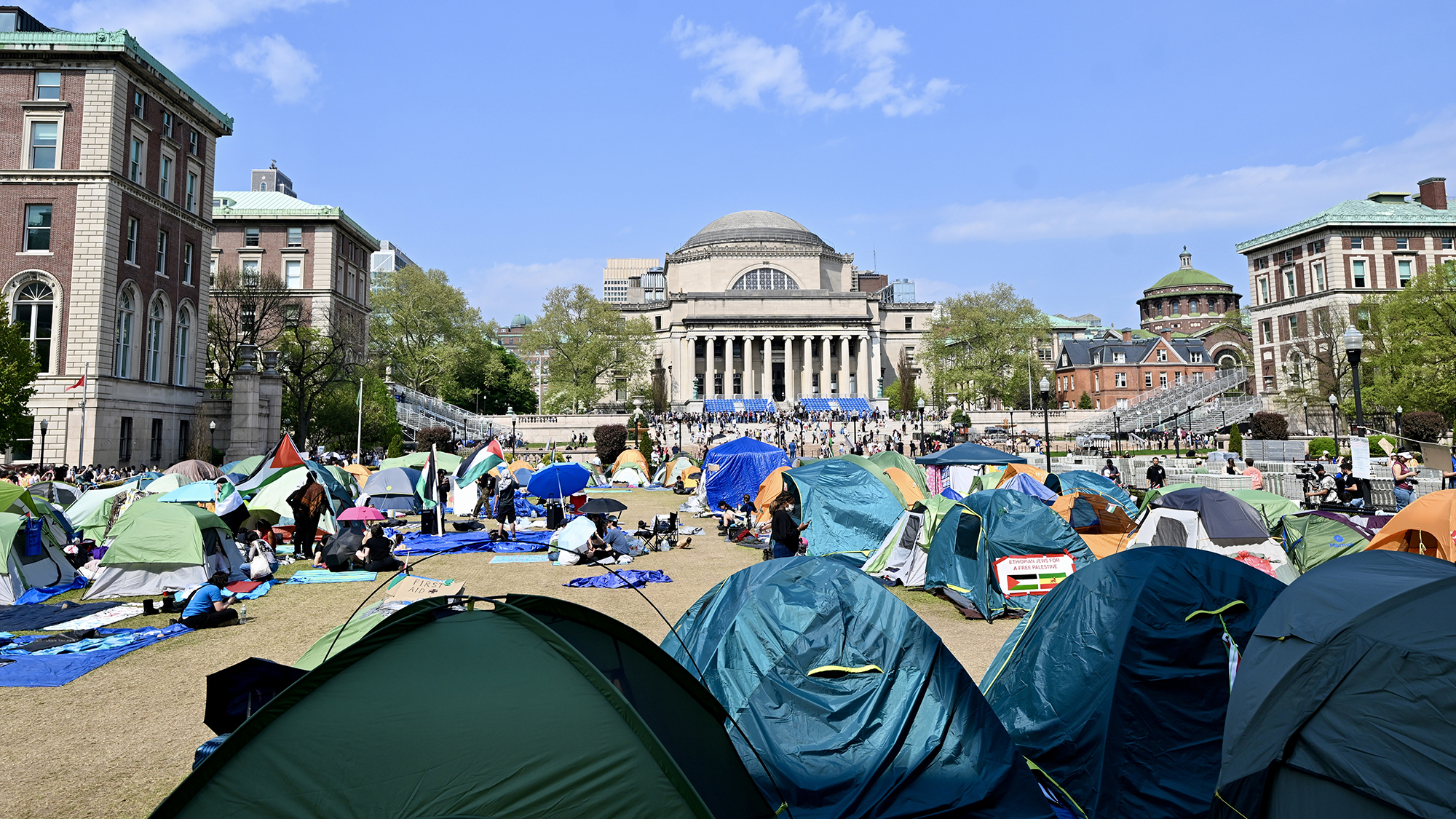Columbia pays $200M to settle with White House
The Trump administration accused the school of failing to protect its Jewish students amid pro-Palestinian protests


A free daily email with the biggest news stories of the day – and the best features from TheWeek.com
You are now subscribed
Your newsletter sign-up was successful
What happened
Columbia University agreed to pay $200 million to the federal government as part of a landmark settlement with the Trump administration.
Following last year's pro-Palestinian protests, the administration had accused the school of violating antidiscrimination laws by "failing to protect students from antisemitic harassment," The New York Times said.
The Ivy League school will also pay $21 million to settle investigations brought by the U.S. Equal Employment Opportunity Commission. In return, the administration will restore most of the $400 million in research grants it canceled in March.
The Week
Escape your echo chamber. Get the facts behind the news, plus analysis from multiple perspectives.

Sign up for The Week's Free Newsletters
From our morning news briefing to a weekly Good News Newsletter, get the best of The Week delivered directly to your inbox.
From our morning news briefing to a weekly Good News Newsletter, get the best of The Week delivered directly to your inbox.
Who said what
Columbia "does not admit to wrongdoing" but recognizes that "reform was and is needed," the university said in a statement. President Donald Trump hailed the agreement as "historic" on Truth Social. The pro-Palestinian group Columbia University Apartheid Divest accused the school of "selling out" its students.
What next?
Columbia has 30 days to appoint an administrator "responsible for overseeing the deal's compliance," Reuters said. Trump indicated similar agreements with other universities "that have hurt so many" would be "upcoming."
A free daily email with the biggest news stories of the day – and the best features from TheWeek.com
Jessica Hullinger is a writer and former deputy editor of The Week Digital. Originally from the American Midwest, she completed a degree in journalism at Indiana University Bloomington before relocating to New York City, where she pursued a career in media. After joining The Week as an intern in 2010, she served as the title’s audience development manager, senior editor and deputy editor, as well as a regular guest on “The Week Unwrapped” podcast. Her writing has featured in other publications including Popular Science, Fast Company, Fortune, and Self magazine, and she loves covering science and climate-related issues.
-
 Why is the Trump administration talking about ‘Western civilization’?
Why is the Trump administration talking about ‘Western civilization’?Talking Points Rubio says Europe, US bonded by religion and ancestry
-
 Quentin Deranque: a student’s death energizes the French far right
Quentin Deranque: a student’s death energizes the French far rightIN THE SPOTLIGHT Reactions to the violent killing of an ultraconservative activist offer a glimpse at the culture wars roiling France ahead of next year’s elections
-
 Secured vs. unsecured loans: how do they differ and which is better?
Secured vs. unsecured loans: how do they differ and which is better?the explainer They are distinguished by the level of risk and the inclusion of collateral
-
 Why is the Trump administration talking about ‘Western civilization’?
Why is the Trump administration talking about ‘Western civilization’?Talking Points Rubio says Europe, US bonded by religion and ancestry
-
 Labor secretary’s husband barred amid assault probe
Labor secretary’s husband barred amid assault probeSpeed Read Shawn DeRemer, the husband of Labor Secretary Lori Chavez-DeRemer, has been accused of sexual assault
-
 Trump touts pledges at 1st Board of Peace meeting
Trump touts pledges at 1st Board of Peace meetingSpeed Read At the inaugural meeting, the president announced nine countries have agreed to pledge a combined $7 billion for a Gaza relief package
-
 NIH director Bhattacharya tapped as acting CDC head
NIH director Bhattacharya tapped as acting CDC headSpeed Read Jay Bhattacharya, a critic of the CDC’s Covid-19 response, will now lead the Centers for Disease Control and Prevention
-
 Witkoff and Kushner tackle Ukraine, Iran in Geneva
Witkoff and Kushner tackle Ukraine, Iran in GenevaSpeed Read Steve Witkoff and Jared Kushner held negotiations aimed at securing a nuclear deal with Iran and an end to Russia’s war in Ukraine
-
 Pentagon spokesperson forced out as DHS’s resigns
Pentagon spokesperson forced out as DHS’s resignsSpeed Read Senior military adviser Col. David Butler was fired by Pete Hegseth and Homeland Security spokesperson Tricia McLaughlin is resigning
-
 Judge orders Washington slavery exhibit restored
Judge orders Washington slavery exhibit restoredSpeed Read The Trump administration took down displays about slavery at the President’s House Site in Philadelphia
-
 Hyatt chair joins growing list of Epstein files losers
Hyatt chair joins growing list of Epstein files losersSpeed Read Thomas Pritzker stepped down as executive chair of the Hyatt Hotels Corporation over his ties with Jeffrey Epstein and Ghislaine Maxwell
